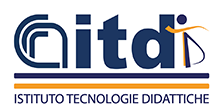- the study of psycho-social phenomenologies and dynamics occurring within virtual learning communities;
- the study of skills need to act effectively within virtual learning communities, i.e. cognitive and meta-cognitive skills, social skills and the ability to control emotion and motivation, rather than actual technological skills.
This theme has a double value - on one hand the experimental study of online learning dynamics and of skills the various actors in the process need (students, tutors, facilitators, teachers) in order to implement them; on the other hand criteria for the design of formative environments and actions based on virtual learning communities. The typical reference contexts are related to initial and in-service teacher training, higher education, and educational processes occurring at all other school levels. The collaborative dimension is increasingly important both in professional activities and in learning processes. On one hand the nature of knowledge is more dynamic and the need for the construction of knowledge as a collaborative network of people is emerging. On the other hand the development of the so-called Computer Mediated Communication makes virtual collaboration easier and minimizes the need for the physical presence of the community. Supplying the conditions to work and learn in a collaborative social context is therefore a major objective for all types of informal and formal learning contexts. More precisely, the research activity focuses on some complementary issues:
- the study of psycho-social phenomenologies and dynamics occurring within virtual learning communities;
- the study of skills need to act effectively within virtual learning communities, i.e. cognitive and meta-cognitive skills, social skills and the ability to control emotion and motivation, rather than actual technological skills.
This theme has a double value - on one hand the experimental study of online learning dynamics and of skills the various actors in the process need (students, tutors, facilitators, teachers) in order to implement them; on the other hand criteria for the design of formative environments and actions based on virtual learning communities. The typical reference contexts are related to initial and in-service teacher training, higher education, and educational processes occurring at all other school levels.
 Italiano (Italia)
Italiano (Italia)  English (United Kingdom)
English (United Kingdom) 
